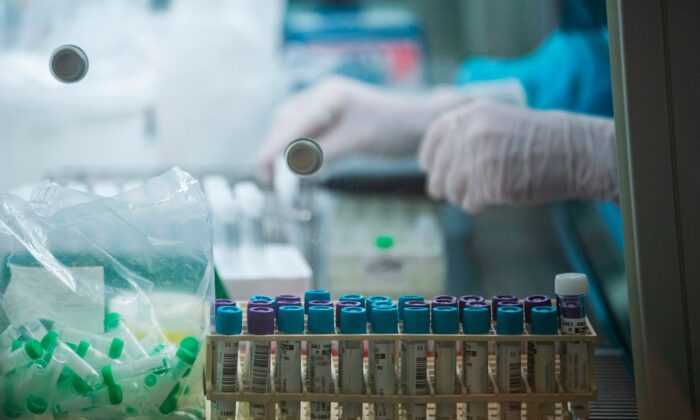Most Recovered COVID-19 Patients Have Broad and Robust Immunity That Likely Provides Some Degree of Protection Against Variants: Study

A medical staff prepares and processes PCR and antibody tests of people who think they may be infected with COVID-19, at the laboratory of Karolinska Hospital in Solna near Stockholm, on Dec. 7, 2020. (Jonathan Nackstrand/AFP via Getty Images)
The Epoch Times - BY MEILING LEE - Updated: July 31, 2021
Most people who have recovered from COVID-19, even with mild illness, retain a broad and durable immunity to the disease, including some degree of protection against its variants, according to an Emory University study published in the journal, Cell Reports Medicine.
The longitudinal study, the most comprehensive of its kind to date, involved 254 COVID-19 patients, between the ages of 18 to 82 years, who provided blood samples at various points for a period of over eight months beginning in April 2020. About 71 percent of the patients had mild disease, 24 percent experienced moderate illness, and five percent had severe disease.
The researchers found that most of the patients who recovered mounted a strong and wide-ranging immune response to the CCP (Chinese Communist Party) virus for up to 250 days.
“We saw that antibody responses, especially IgG antibodies, were not only durable in the vast majority of patients but decayed at a slower rate than previously estimated, which suggests that patients are generating longer-lived plasma cells that can neutralize the SARS-CoV-2 spike protein,” Rafi Ahmed, director at Emory Vaccine Center and lead author told Emory News Center on July 22. SARS-CoV-2 is the scientific name of the CCP virus that causes the disease COVID-19.
The authors said that natural immunity after recovery from the disease offered some degree of protection against variants as research suggests that COVID-19 vaccines may be slightly less effective against them.
“The immune response to natural infection is likely to provide some degree of protective immunity even against SARS-CoV-2 variants because the CD4+ and CD8+ T cell epitopes will likely be conserved,” the authors wrote.
The Centers for Disease Control and Prevention (CDC) says it is monitoring multiple variants, but only four are of concern since they “seem to spread more easily and quickly than other variants.” While experts say while variants may be more transmissible, that does not necessarily translate to more severe disease or fatalities.
The Indian or delta variant currently accounts for over 80 percent of all new sequenced cases in the United States. Scientists say more research is still needed to confirm if infection with this variant is associated with more severe disease, hospitalization, and death.
The other three variants of concern, named according to where they were first identified, are the United Kingdom variant, the South African variant, and the Brazilian variant.
The authors also found that COVID-19 recovered patients displayed stable antibody responses to the other human coronaviruses that cause the common cold, the Middle East Respiratory Syndrome, or the severe acute respiratory syndrome (SARS-CoV).
“These data are most consistent with the generation of long-lived plasma cells and refute the current notion that these antibody responses to human coronaviruses are short lived,” the researchers said. “Moreover, the COVID-19 patients mounted increased IgG antibody responses to SARS-CoV-1, a related pathogen that none likely had experienced previous exposure to.”
The researchers will continue to follow the cohort for several years, with the last sample collection of the participants set for February 2023. Doing so allows the researchers to gather more data to “define the progression to long-lived immunity” to the CCP virus after natural infection.
The findings add to the growing body of research that indicates that recovered COVID-19 patients develop long-lasting immunity.
A limitation of the study is that it didn’t include more severe COVID-19 patients and those who are asymptomatic. However, the authors noted that “mild-moderate illness accounts for [more than] 80 percent of COVID-19 cases, highlighting the relevance of our findings over time.”
The authors said that the study’s findings will “also serve as a benchmark for immune memory induced in humans by SARS-CoV-2 vaccines.”
3.5% Vs. 1% – Why Most People don't Matter – Erica Chenoweth - 02 Aug 2021 - PDF VERSION
An old TED talk I've had in the back of my mind for a long time. Many people, myself included, are often disappointed in fellow humans. But remember that the vaccinated Vs unvaccinated ratio is not fixed, since the jabs do not work. In the fall people will have to get boosters, hopefully, some have had "too much to think" by then, and will join the unvaccinated group rather than risking their health for no good reason.
VACCINE FAILURE! Patients Hospitalized, Dying Mostly FULLY 'VACCINATED'! - Stew Peters Show Published July 30, 2021- PDF VERSION
COPYRIGHTS
Copy & Paste the link above for Yandex translation to Norwegian.
WHO and WHAT is behind it all ? : >
The bottom line is for the people to regain their original, moral principles, which have intentionally been watered out over the past generations by our press, TV, and other media owned by the Illuminati/Bilderberger Group, corrupting our morals by making misbehavior acceptable to our society. Only in this way shall we conquer this oncoming wave of evil.
Commentary:
Administrator
HUMAN SYNTHESIS
All articles contained in Human-Synthesis are freely available and collected from the Internet. The interpretation of the contents is left to the readers and do not necessarily represent the views of the Administrator. Disclaimer: The contents of this article are of sole responsibility of the author(s). Human-Synthesis will not be responsible for any inaccurate or incorrect statement in this article. Human-Synthesis grants permission to cross-post original Human-Synthesis articles on community internet sites as long as the text & title are not modified